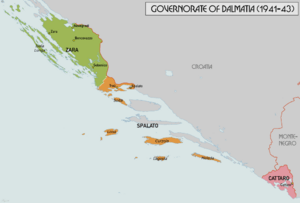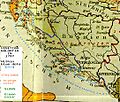Italian irredentism in Dalmatia facts for kids

Italian irredentism in Dalmatia was a political idea. It was popular in the 1800s and 1900s. People who supported it wanted the region of Dalmatia to become part of Italy. Dalmatia is a coastal area along the Adriatic Sea.
History of Dalmatia and Italy
In the mid-1800s, an official count of people was done in Dalmatia. This count, from 1857, showed that most people living there were Croatians. There were also about 45,000 Dalmatian Italians. This meant Italians made up about 10.8% of the total population.
Dalmatia was an important area during World War I. Both Italy and Serbia wanted to take control of it from Austria-Hungary.
During World War II, in 1943, Josip Broz Tito told the Allied forces that the city of Zara (now called Zadar) was very important for German supplies. He made it seem more important than it was. This convinced the Allies that it was a key military target.
Italy gave up fighting in September 1943. After this, from November 1943 to October 1944, Allied planes bombed Zara many times. The city was bombed 54 times.
About 2,000 people died under the fallen buildings. Many people, between 10,000 and 12,000, left the city. They found safety in Trieste or Apulia.
Tito's soldiers entered Zara on October 31, 1944. Another 138 people were killed then. After the war, in 1947, a peace treaty was signed. Italians still living in Zara and Dalmatia had to leave. This event is known as the Italian exodus from Istria and Dalmatia. Today, only about 100 Dalmatian Italians still live in Zadar.
Related topics
Images for kids
-
Austrian linguistic map from 1896. In green the areas where Slavs were the majority of the population, in orange the areas where Istrian Italians and Dalmatian Italians were the majority of the population. The boundaries of Venetian Dalmatia in 1797 are delimited with blue dots.
See also
 In Spanish: Irredentismo italiano en Dalmacia para niños
In Spanish: Irredentismo italiano en Dalmacia para niños
 | Delilah Pierce |
 | Gordon Parks |
 | Augusta Savage |
 | Charles Ethan Porter |






